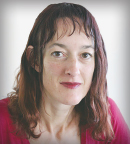Formal discussant of this study, Suzette Delaloge, MD, MSc, of Gustave Roussy, Villejuif, France, stated: “This is a big step forward and an amazing set of new knowledge. This presentation is a meaningful demonstration of the role of PM2.5 [particulate matter 2.5 µm in diameter] air pollutants in the promotion of cancer that explains never-smokers with lung cancer. It is the first demonstration of a nonmutagenic carcinogenic promotion hypothesis for fine particulate matter.”
She added: “Before this meeting, we knew that [treatment of patients with] non–tobacco-related lung cancer is a major medical need, with several risk factors including air pollutants, radon, and professional exposures, but the causal mechanism remained unknown, and there has been no means of prevention.”

Suzette Delaloge, MD, MSc
Dr. Delaloge continued: “Before this, we also knew that each increment of density of PM2.5 increased the risk of lung cancer mortality. But until now, the classic vision was that carcinogens cause an accumulation of cancer-prone mutations, and the role of non–cell-autonomous processes was questioned in tumor growth.”
She explained: “These data confirm the presence of EGFR driver mutations in 15% of normal lung samples in two new cohorts, and KRAS mutations are found in 53% of normal lung tissue. The presence of these mutations increases with age. The results confirm that PM2.5 increases the risk of several cancers including lung cancer. We can correlate PM2.5 exposure with the incidence of EGFR-mutant lung cancer worldwide. Now, we know the major mechanism is the attraction of macrophages that secrete interleukin-1 beta (IL-1β).”
DISCLOSURE: Dr. Delaloge has received travel funding from AstraZeneca, Pfizer, Roche, and Pierre Fabre; has held a consulting or advisory role with AstraZeneca, MSD, Rappta, Besins, Gilead, and Elsan; and has received institutional research funding from Sanofi, Pfizer, Novartis, AstraZeneca, Roche Genentech, Lilly, Puma, Orion, Amgen, Servier, MSD, BMS, Pierre Fabre, Seagen, Exact Sciences, Rappta, Taiho, European Commission, French government, and Fondation ARC.

